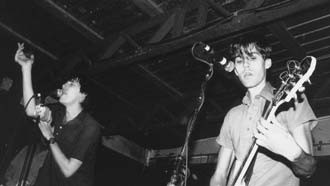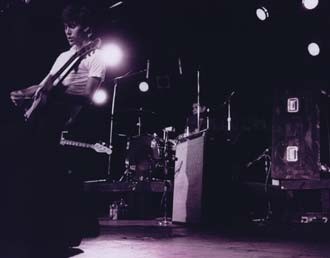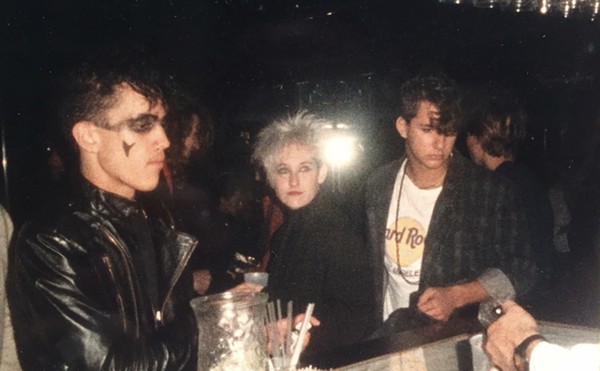|
With new rarities compilation, Glorium makes a brief, brilliant return Glorium never officially disbanded, so the group's spate of Thanksgiving weekend activity - gigs in San Antonio and Austin, and the release of a new compilation CD - isn't exactly a reformation. But for this artfully chaotic underground-rock quintet, which has played only one gig since 1997, it does constitute a chance to put a final punctuation mark on its own legacy. In recent years, the band's personnel has scattered, with vocalist Paul Vodas and his guitar-playing brother Lino Max in New York, bassist Jorge Lara and guitarist Ernest Salaz in Austin, and drummer Juan Ramos in San Antonio. During their time together, the group assembled a cache of quality recordings that never saw the light of day, or were relegated to little-heard singles and multi-band compilations. Included among these recordings was the band's final set of tracks, cut in Austin with ex-Zeitgeist guitarist John Croslin. "Those songs were meant for an album to be put out toward the end, and it just never happened," says Ramos, a gifted visual artist and drummer for the Latino-soul band Sexto Sol. "I always kind of regretted that, because I thought that those were our best recordings. We put out a few 7-inch records with those on them, but there's only a few people that really buy those things, so it was like they were never released anyway."
"I just thought that we were never going to get this chance again," Ramos says, by way of explaining the compilation's timing. "Jorge is going to finish his doctorate degree, Ernest is married now, Paul's getting married next year, I'm already married and have a kid. Chances are, we're not going to do this again." The glory of Glorium had a lot to do with the divergent musical backgrounds of its members. Ramos and Lara - the rhythm section - were both cover-band veterans with fairly orthodox musical tastes. Ramos grew up a heavy-metal devotee, while Lara was legendary for his love of Rush. Vodas, Max, and Salaz, on the other hand, shared an avant-garde mindset which paid little heed to popular notions of song structure, melody, or meter. "Ernest and Paul had already been in a band called Crowbar," Ramos recalls. "That band was totally improvisational, lots of noise, and not conventional at all for a rock band. They didn't even have a regular rhythm section, and Paul did sort of spoken-word stuff. Meanwhile, I had been in a cover band that played whatever was on the radio and we played dance clubs and made pretty good money, and Jorge also had been in a cover band. We were into playing rock songs, with the structures of rock songs, and the way the rhythm section works together.
"Having the Devil On Your Side," one of the highlights from the 1994 album Cinema Peligrosa, feels like War's "Lowrider" played in seven-four time by Fugazi. "One of the things I liked `about Glorium` is that the guitars almost never played the same thing, and the bass player is not doubling what one of the guitars is doing. That sort of layering of sound, and the different rhythms, is also part of what we did. The guitars were very noisy and that fit with what Paul was doing. He'd never be accused of being a singer. He was a vocalist," Ramos says with a laugh. In 1993, the band opened a San Antonio show by Fugazi at Showcase, on West Avenue. A year later, Fugazi leader Ian MacKaye called to ask if Glorium could fill in on one leg of Fugazi's upcoming tour. "The other band who was opening for Fugazi was called Branch Manager," Ramos says. "We alternated with them when it came to playing first or second. What was funny was that every time we played second, we sold more merchandise. I guess when you play second, people assume, 'They must be better.'" Aside from one show where a girl sat on stage and flicked ice cubes at Vodas, Ramos remembers the tour as an "awesome experience."
"It's a real mixed bag," Ramos says. "I thought, whatever we have that's meaningful to us, we should just go ahead and put it out. "Coming from an art-world perspective, I put a lot of time, effort and work into making art work that's only going to be seen by a certain number of people, and all of that is meaningful and worthwhile to me, so it doesn't seem like a stretch to me to think, 'It's a limited-edition, and it's not a national release, but it still means something to me.'" •
|

KEEP SA CURRENT!
Since 1986, the SA Current has served as the free, independent voice of San Antonio, and we want to keep it that way.
Becoming an SA Current Supporter for as little as $5 a month allows us to continue offering readers access to our coverage of local news, food, nightlife, events, and culture with no paywalls.
Scroll to read more Music Stories & Interviews articles
Newsletters
Join SA Current Newsletters
Subscribe now to get the latest news delivered right to your inbox.


















